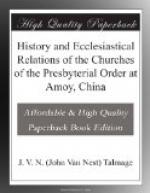“When, in the order of business on Thursday morning, there seemed a suitable opportunity for me to address the Synod, I was sitting near Dr. Porter, and remarked to him that I wished to make such address. He said that he desired to speak first. He arose and addressed the Synod, in substance, as is reported. I was altogether surprised, for I had given him no authority to speak for me; neither had I expressed to him or any other man the sentiments he attributed to me. I felt that his speech was altogether unfortunate, for it seemed almost to demand of me a restatement of my views. But I felt, also, that it would be improper, then, to occupy the time of Synod with any further discussion, and contented myself with merely taking exception to Dr. Porter’s statement, saying that I could not use the language he had just used.
“I also stated that although the Synod had not arrived at the best decision, yet perhaps it was the best under all the circumstances. As these circumstances seem to be entirely misunderstood by some, I may now explain them. I had remarked in the previous debate, and still firmly believe, that the decision of Synod, if it be fully carried out, would only be disastrous in its results, as far as the churches at Amoy were concerned. But there was another disaster to be apprehended. If the Synod had allowed the work of God to proceed at Amoy, as it had always been carried forward, and with such marvelous blessings from on high, for so many years past, it was feared that some of the members of Synod would use their influence in the Church against that Mission, to such an extent as possibly to cut off the resources of the mission. Such were the circumstances to which I alluded, and I was well understood, at least by some of the members of Synod. It seemed necessary to choose between two evils. My own opinion was, and is, that the Synod had chosen the greater evil, still I was willing to yield ‘the benefit of the doubt,’ and therefore remarked that perhaps (I used the word ‘perhaps’) the decision was the best under the circumstances.
“I did express for myself, and as I believed, in accordance with the views of the Missionaries at Amoy, that we did not wish, and never had wished to disobey the injunctions of Synod. Besides this, we were under obligations to do what was best for the churches under our care. If we were not allowed to do that which is absolutely best, we should do the best we could.
“I also expressed my gratitude that the Synod had manifested so much patience and Christian courtesy towards myself and the Mission, for with one or two exceptions, not an unkind word had been uttered.
“The closing sentence of my remarks being somewhat playful, might have been omitted from the report, but if thought worthy of publication, it should have been given correctly. I know that I can give it now with accuracy, almost verbatim.




